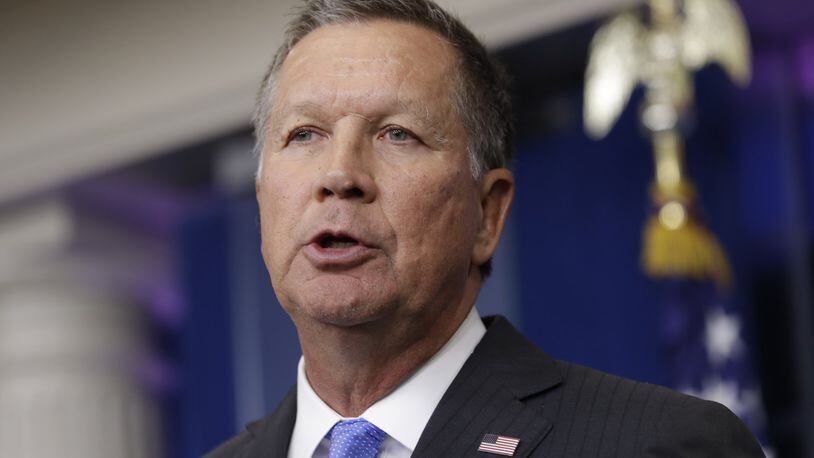Kasich’s visibility is a clear sign that if Republican presidential nominee Donald Trump loses the election, the Ohio governor will be at the center of what will be an intense quarrel on how the party can recover from its fifth defeat in the past seven presidential elections.
Kasich not only will refuse to vote for Trump, he has assailed Trump’s opposition to the 12-nation Pacific free-trade pact, telling CBS “if you lock the doors in our country, consumers will pay more and jobs will be lost,” adding China will be the winner should Congress kill the agreement.
By talking trade, he is trying to re-connect with economic conservatives appalled with Trump’s avowed protectionism. And by allying himself with President Barack Obama on the Pacific pact, he is demonstrating he can work with both parties.
“When this election is over, the battle for the heart and soul of the party and the future of the country is not going to be for the faint of heart,” said John Weaver, who was chief strategist to Kasich’s presidential campaign.
“I know the governor intends to be involved in that with both feet,” Weaver said. “He has every intention of being active in that debate after November.”
Jeff Sadosky, former communications director for Sen. Rob Portman, predicted a Trump defeat would be the “start of a likely six-to-eight month debate — and worst-case scenario, a food fight — about how to rebuild and who the party will be rebuilding around.”
By taking an active role in the dispute, Kasich keeps alive his hopes of running for president in 2020. Although Kasich is not expected to deliver an I-told-you-so speech after the election, look for him to assert Trump’s acidic style helped shred the Republican Party.
Never one to take the subtle approach, Kasich can barely hide his scorn for Trump, telling CBS that the New York real estate developer’s claims that the election is rigged for Clinton is “like saying we never landed on the moon.”
Other Republicans say Kasich is engaging in wishful thinking. During his presidential campaign, he highlighted his moderate side and assumed the role of “the scold of the Republican Party,” according to one GOP official.
“I have no idea if he’ll run or not,” said Barry Bennett, a Republican strategist and former senior adviser to Trump’s campaign. “But first he’ll have to choose which party he belongs to.”
Kasich spokesman Chris Schrimpf said Kasich remains “governor of Ohio and concerned for his country but is not thinking about anything beyond that.” But those close to Kasich say he is trying to demonstrate to Republicans that “there are some adults in the room.”
Polls show that Trump’s chances of winning are improbable. He has so antagonized women, Hispanics and college educated Americans, that Democrats have a chance to gain control of the U.S. Senate and chip away at the Republican majority in the U.S. House.
“If Trump loses badly, the narrative will switch from those who didn’t support such as” Kasich, House Speaker Paul Ryan of Wisconsin and Sen. John McCain of Arizona “to those who gave us Trump in the first place,” said one Republican who spoke on condition of anonymity. “They’re the ones who elected Hillary president.”
There are risks to Kasich’s approach. In 1964 when GOP conservatives nominated Barry Goldwater for president, New York Gov. Nelson Rockefeller and other Republican liberals abandoned the ticket.
By contrast, former Vice President Richard Nixon stuck with Goldwater even though privately he knew the Arizona senator would lose. Four years later, conservatives helped Nixon win the presidential nomination while turning away from Rockefeller.
“Trump is not my cup of tea but he won the nomination fair and square,” said John Feehery, a Republican consultant in Washington who backed Kasich during the primaries.
“Someone will have to unite the party and I don’t think the ‘Never Trumpers’ will unite the party,” Feehery said. “Eighty percent of the party is going to support Trump. It’s a dangerous place to be.”
So Kasich plows ahead. He is working on a book about his presidential campaign and the country’s future. This week he will fly to Chicago to campaign for Rep. Robert Dold, R-Ill. He remains so well known that during one visit to New York City people stopped to ask for selfie photos.
“Next to the speaker, he is the most active surrogate we have in the party,” Weaver said, adding while he wants Kasich to run for president in 2020, he acknowledged “that is something he and his family will have to discuss at the right time. But now is not the right time.”
